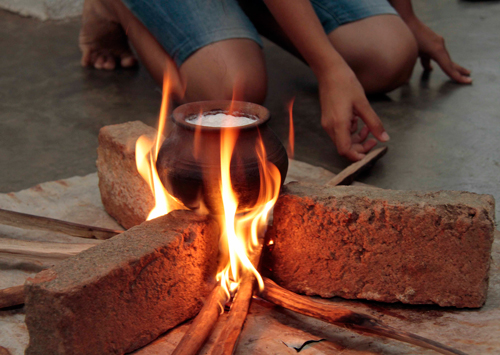When the crackers went silent and hearths put out

This Avurudu will not be the same, but one can still engage in traditional activities such as boiling milk in the confines of one’s home. Pic by Indika Handuwala
April 1935 was to be a rather grand Avurudu. Ceylon was still a British colony and the silver jubilee of King George V and Queen Mary fell that year and this meant New Year celebrations could quadruple. The ‘Sailor King’ was beloved for his solid values and mores, and all the pomp of the jubilee year was much anticipated.
But the people’s visions of celebration were soon lost in an eddy of trouble which turned into a great tragedy. In November 1934, the Malaria epidemic- to go down the annals as “the greatest pestilence in the recorded history of the island”- took the country in its grip.
According to author Somasiri Kasturiarachchi, in just seven months the epidemic claimed the lives of 80,000- out of a total of one and a half million afflicted. This particular bout of ague or ‘jungle fever’, as the tropical disease was known, was an oddity- firstly because it was caused by a drought (and not excessive rain) and also because it triggered two waves of mortality- rather than the usual one.
To us living in the shadow of coronavirus, the story offers solace. It was in the cusp of the Avurudu that the government and health authorities rallied forth magnificently and brought an end to the plague.
Though the disease took its toll, the majority was able to survive, and witness the jubilee celebrations that unfurled in grandeur across the empire in May.
Who could say that the ‘Prince of Avurudu’ had no hand in it?
Fast forward some 36 years into the future, and the Avurudu celebrations would again be under a pall when the JVP insurrection of 1971 shook the country.
Avurudu celebrations were again suspended with startlingly short notice two years later, this time- because of the death of a great statesman.
Dudley Senanayake, the second Prime Minister of Ceylon and son of the country’s first Prime Minister D.S. Senanayake, was taken from Woodlands, the Senanayake family home in Borella to the Durdans Hospital in the evening of April 13, 1973.
There was no serious complaint. He was attended to by Dr. D. J. Attygalle and Dr. W. B. Wijenaike, but passed away at 11.10 p.m.
The preparations for Avurudu had been grand as the Prime Minister was Mrs. Sirimavo Bandaranaike- who with her strong Kandyan Buddhist roots cherished the old rituals- to be celebrated in the midst of family.
Veteran journalist Tilakaratne Kuruvita Bandara remembers that the news spread like lightning. “Those who were making kevum overnight put off the hearth. The following day there was to be no kiribath anywhere.”
While D. S. Senanayake was the Father of the Nation, his son Dudley was himself a paternal figure- called bath dun piya or the “father who gave us rice”- an epithet recalling the two seers of free rice given to everyone during his premiership.
Many were the legends grown around him- among these how he drove home all alone after ending the term of office as PM, and how, at the end, his bank account held “only some two hundred Rupees”.
Like D.S. who, sarong tucked up and bare chested, would wade into paddy fields, Dudley too had the common touch and could get along uproariously well with farmers. Besides, he was loved for the service he rendered to Buddhism- including restoring that fabled old stupa- the Kirivehera of Kataragama.
Mrs. Bandaranaike requested that national flags be flown at half-mast and all Avurudu festivals were cancelled.
A meeting was held at the old Sri Kotha in Colpetty as to how the funeral should be organized.
While the remains were kept at Woodlands for the first two days, they were moved to the old Parliament at Galle Face till April 21 when the funeral was to happen.
The queues of people waiting to pay respects, says Mr. Kuruvita Bandara, reached all the way to Colpetty. People flocked in from all over the island to Colombo, and the taxi drivers for once offered free rides for anyone who had come for the funeral.
On April 21 the pyre was built in front of the D. S. Senanayake statue in Torrington.
The obsequies go down as one of the few funerals of laymen attended by the prelates of Asgiriya and Malwatte.
These reminiscences should remind us of J. M. Barrie’s “all of this has happened before, and it will all happen again.” But more importantly, “Good times repeat themselves much more often than the bad ones.” Such are the lessons of the Spirit of Avurudu Past.
| Making the most of this year’s Avurudu | |
| What kind of message would the Spirit of Avurudu Present have for us? We spoke to some well known personalities about how to make most of the approaching New Year. Emeritus Professor of Sinhala, J B. Disanayaka says it’s time to clean up. “Beginning with your kitchen (which is an old Avurudu tradition) you can clean your house and get rid of all unwanted things. But at the same time look to your personal hygiene- and most importantly that of the mind. “Clean the ‘metaphorical’ dirt- the ‘defilements’ of the mind. One of the best ways to do this is to cast away jealousy or ill feeling, and maybe call and greet someone you had fallen out with.” Prof. D.C.R.A. Goonetilleke reminds that we can keep in touch with friends and relatives via our computers and phones, and make kiribath even if not kevum and kokis. Though the aspect of enjoyment may be less, keep up the hope! he says, for Avurudu is always auspicious. Mr. Kuruvita Bandara adds this caution: behave responsibly and observe the curfew, while remembering to observe your religious rituals at home.
|



